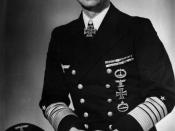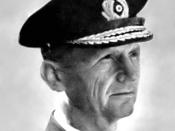In both world wars, Britain was to find itself in a desperate situation. In 1917 and 1941 respectively, the supply situation got to such a severe point that it seemed that unless things got better drastically and immediately, then Britain would be required to sue for peace. Jellicoe declared in 1917 that 'It is impossible for us to go on with the war if losses like this continue' . By 1941 the joint chiefs themselves recognised that Britain was again in such a similar situation, and without a turn around in shipping losses they would be totally unable to gain victory of the Axis forces in Europe and to destroy the expansionist Japanese forces in the East. Churchill was well within his rights to show his fear for the U-boats; he had seen in the Great War just how effective they could be when he was part of the admiralty.
The first signs of worry would be seen on the 3rd of September, right at the very beginning of the conflict. Despite being under strict orders to obey the 'Prize Law' , the rules laid down to prevent unarmed vessels being sunk unnecessarily in war times, 'Unterseeboot' U30 sank the British liner Athenia off of the coast of Scotland. From here, the British soon became dogged by German U-boat patrols across the channel and it became an area of for the two sides to battle it out while the phoney war was being played out in Western Europe. Unlike the First World War though, Britain would find its trans-Atlantic convoy routes reachable all across the ocean due to the Germans being able to launch U-boats from the Western coast of France. In order to defeat the British, Karl Dönitz, commander of the U-boat force, claimed that if he could sink...


